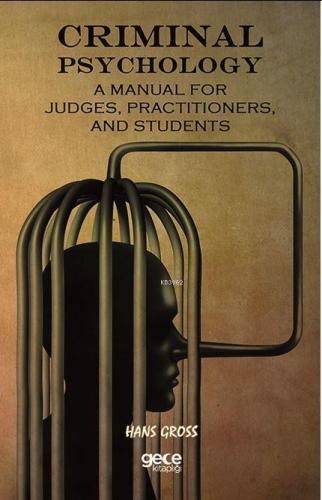9786052882863
497812

https://www.hesapli24.com/criminal-psychology-a-manual-for-judges-practitioners-and-students
Criminal Psychology: A Manual For Judges, Practitioners, And Students
17.20
Our method will be that fundamental to all psychological investigation, and may be divided into three parts:
1. The preparation of a review of psychological phenomena.
2. Study of causal relationships.
3. Establishment of the principles of psychic activity.
The subject-matter will be drawn on the one hand, from that already presented by psychological science, but will be treated throughout from the point of view of the criminal judge, and prepared for his purposes. On the other hand, the material will be drawn from these observations that alone the criminologist at work can make, and on this the principles of psychology will be brought to bear.
We shall not espouse either pietism, scepticism, or criticism. We have merely to consider the individual phenomena, as they may concern the criminalist; to examine them and to establish whatever value the material may have for him; what portions may be of use to him in the interest of discovering the truth; and where the dangers may lurk that menace him. And just as we are aware that the comprehension of the fundamental concepts of the exact sciences is not to be derived from their methodology, so we must keep clearly in mind that the truth which we criminalists have to attain can not be constructed out of the formal correctness of the content presented us. We are in duty bound to render it materially correct. But that is to be achieved only if we are acquainted with principles of psychology, and know how to make them serve our purposes. For our problem, the oft-quoted epigram of Bailey's, "The study of physiology is as repugnant to the psychologist as that of acoustics to the composer," no longer holds. We are not poets, we are investigators. If we are to do our work properly, we must base it completely upon modern psycho physical fundamentals. Whoever expects unaided to find the right thing at the right moment is in the position of the individual who didn't know whether he could play the violin because he had not yet tried. We must gather wisdom while we are not required to use it; when the time for use arrives, the time for harvest is over.
Our method will be that fundamental to all psychological investigation, and may be divided into three parts:
1. The preparation of a review of psychological phenomena.
2. Study of causal relationships.
3. Establishment of the principles of psychic activity.
The subject-matter will be drawn on the one hand, from that already presented by psychological science, but will be treated throughout from the point of view of the criminal judge, and prepared for his purposes. On the other hand, the material will be drawn from these observations that alone the criminologist at work can make, and on this the principles of psychology will be brought to bear.
We shall not espouse either pietism, scepticism, or criticism. We have merely to consider the individual phenomena, as they may concern the criminalist; to examine them and to establish whatever value the material may have for him; what portions may be of use to him in the interest of discovering the truth; and where the dangers may lurk that menace him. And just as we are aware that the comprehension of the fundamental concepts of the exact sciences is not to be derived from their methodology, so we must keep clearly in mind that the truth which we criminalists have to attain can not be constructed out of the formal correctness of the content presented us. We are in duty bound to render it materially correct. But that is to be achieved only if we are acquainted with principles of psychology, and know how to make them serve our purposes. For our problem, the oft-quoted epigram of Bailey's, "The study of physiology is as repugnant to the psychologist as that of acoustics to the composer," no longer holds. We are not poets, we are investigators. If we are to do our work properly, we must base it completely upon modern psycho physical fundamentals. Whoever expects unaided to find the right thing at the right moment is in the position of the individual who didn't know whether he could play the violin because he had not yet tried. We must gather wisdom while we are not required to use it; when the time for use arrives, the time for harvest is over.
Yorum yaz
Bu kitabı henüz kimse eleştirmemiş.











